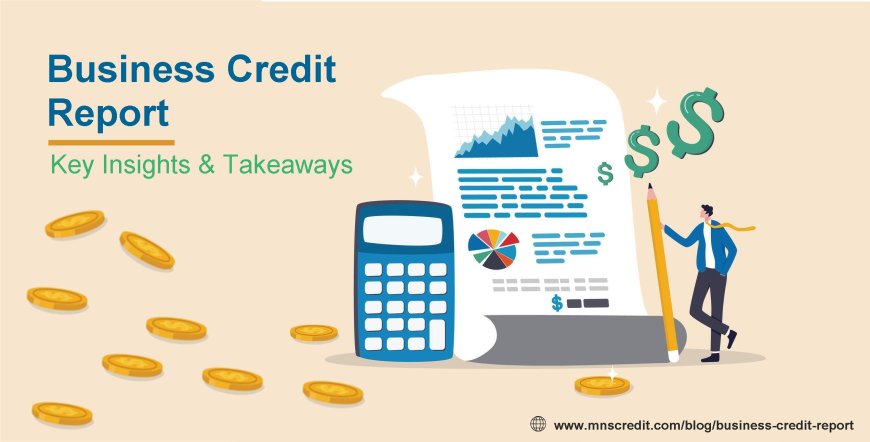Understanding a Company Credit Report: Key Insights & Takeaways

In todays interconnected and data-driven business environment, trust is currency. Whether you're a lender evaluating risk, a supplier assessing payment reliability, or a business owner aiming to grow sustainably, access to trustworthy financial data is essential. A business credit report, also known as a company credit report, plays a vital role in this decision-making process.
A business credit report is much more than a financial snapshot. It provides detailed insights into a companys credit history, payment behavior, and overall financial stability. In this article, we break down the core elements of a business credit report, explain why it matters, how to improve it, and what key takeaways businesses should keep in mind when interpreting one.
What Is a Business Credit Report?
A business credit report is a compiled record of a companys financial background, creditworthiness, and payment behavior, maintained by business credit bureaus such as Dun & Bradstreet, Experian Business, and Equifax Commercial. These agencies collect data from a variety of public and private sources to generate a profile that third parties can use to assess the financial health of a business.
Unlike personal credit reports, business credit reports are tied to a companys Employer Identification Number (EIN) rather than a Social Security Number. This makes it possible for a business to build its own credit profile separate from the personal credit of its owners or executives.
Components of a Company Credit Report
Understanding whats inside a business credit report is crucial for interpreting its meaning and impact. The typical report includes the following components:
1. Business Identification Information
This section contains basic but vital data that uniquely identifies a company, such as:
-
Business name and aliases
-
Physical and mailing addresses
-
Phone numbers and website URLs
-
Federal Employer Identification Number (EIN)
-
Type of business entity (LLC, corporation, etc.)
-
Industry classification (SIC and NAICS codes)
-
Years in business and operational status
This foundational information ensures accuracy in matching the report to the correct business entity.
2. Credit Scores and Ratings
Each credit bureau uses its own scoring models to assess a businesss creditworthiness. The most common include:
-
Dun & Bradstreet PAYDEX Score (0100): A score of 80+ indicates that a business consistently pays its suppliers on time or early.
-
Experian Intelliscore Plus (1100): This score predicts the likelihood of delinquency within the next 12 months.
-
Equifax Business Credit Risk Score (101992): Evaluates the likelihood of serious credit delinquency.
Some reports may also include a Financial Stress Score or Credit Limit Recommendation to help third parties evaluate credit capacity and risk.
3. Trade Credit Information
Trade lines are the backbone of a business credit report. These reflect the companys payment history with suppliers and service providers. Key data includes:
-
Number of reported trade accounts
-
Amounts owed and past due
-
Payment terms (e.g., Net 30, Net 60)
-
Days Beyond Terms (DBT) how many days late a payment was
-
Industry comparatives
A consistent pattern of timely payments enhances credibility, while late or missed payments damage creditworthiness.
4. Public Records
This section contains legal and financial filings pulled from public databases. It includes:
-
Bankruptcies (Chapter 7 or Chapter 11)
-
Tax liens and judgments
-
Lawsuits or legal actions
-
UCC filings (Uniform Commercial Code liens)
Recent or unresolved entries in this section can severely impact a companys perceived stability.
5. Collections and Delinquencies
Reported collections activity shows that a creditor or supplier had to turn to a collections agency to recover unpaid debts. These red flags are significant in credit decision-making.
6. Credit Utilization and Debt Summary
Some business credit reports summarize outstanding loans, revolving credit usage, and total credit available. A high credit utilization ratio may signal poor cash flow management, which can negatively impact credit scores.
Why Business Credit Reports Matter
1. Financing and Lending Opportunities
Lenders, including banks and alternative finance providers, heavily rely on business credit reports when evaluating loan applications. A strong credit profile leads to:
-
Higher loan approval rates
-
Lower interest rates
-
More favorable repayment terms
-
Larger loan or credit line amounts
2. Vendor and Supplier Trust
Suppliers and service providers often review a business credit report before extending trade credit. A solid payment history may allow businesses to negotiate longer payment cycles or larger purchase limits.
3. Partnerships and Contracts
Before signing large contracts or entering strategic partnerships, businesses often conduct credit checks to assess risk. A poor business credit report can raise concerns and even cost an opportunity.
4. Insurance and Lease Agreements
Insurance providers and commercial landlords may use business credit data to assess reliability. A high-risk report could lead to higher insurance premiums or less favorable lease terms.
5. Reputation and Competitive Advantage
A clean credit history contributes to a companys reputation in the marketplace. This can be especially important when bidding for government contracts or large enterprise deals.
How to Obtain and Monitor a Company Credit Report
Business credit reports are not free like personal credit reports, but they are publicly accessible through commercial credit bureaus. You can check:
-
Your own businesss credit report to monitor accuracy and maintain a strong profile.
-
A partner or customers credit report before entering business relationships.
Major Credit Bureaus:
- Dun & Bradstreet (via D-U-N-S Number)
- Experian Business
- Equifax Commercial
These platforms offer one-time reports or subscriptions for ongoing monitoring. Some financial service providers and fintech platforms also offer integrated credit monitoring tools.
How to Improve a Business Credit Report
A low or sparse credit report can be improved over time by taking the following actions:
1. Establish Trade Credit Accounts
Work with vendors that report payment history to credit bureaus. The more positive references you build, the stronger your report becomes.
2. Pay Bills Promptly
Timely payments are the most important factor. Always aim to pay suppliers and lenders by the agreed dateor earlier.
3. Monitor and Dispute Inaccuracies
Regularly check your business credit report for errors such as incorrect payment records, outdated public filings, or accounts that dont belong to your business.
4. Reduce Credit Utilization
Keep balances on credit lines and business cards low relative to your available credit. This signals responsible cash flow management.
5. Avoid Legal and Financial Trouble
Prevent tax liens, lawsuits, and defaults. These public records can remain on your report for several years and substantially lower your score.
Common Misconceptions About Business Credit Reports
1. Only large businesses need to worry about credit reports.
False. Even small and micro-businesses are subject to credit evaluations, especially when applying for vendor accounts or leases.
2. My personal credit covers my business.
Not necessarily. While some lenders do look at both, business credit is assessed independently and is critical for business-only decisions.
3. All vendors report to credit bureaus.
In fact, many do not. Its important to establish trade lines with vendors who report payments if you want to build a credit profile.
Key Takeaways
-
A business credit report is a crucial document used by lenders, vendors, insurers, and partners to assess a companys financial stability.
-
Reports include data such as identification details, credit scores, payment history, public records, and more.
-
A strong credit profile offers businesses access to better financing, supplier terms, and opportunities.
-
Regular monitoring, accurate reporting, and timely payments are essential to building and maintaining a healthy business credit score.
-
Misunderstanding or ignoring business credit can lead to missed opportunities and higher costs.
Conclusion
In a world where credibility and trust can make or break business relationships, your companys credit report is one of the most powerful tools at your disposal. It serves not only as a record of your financial past but also as a predictor of future reliability. Whether youre aiming to grow your business, form new partnerships, or simply operate more efficiently, paying attention to your business credit report can position you for success.
By actively managing your companys credit profile, you demonstrate financial responsibility and open the door to long-term, strategic opportunities.
















![Top 9 Real Estate Mobile App Developers in Riyadh, Saudi Arabia [2025 Edition]](https://www.biphoo.uk/uploads/images/202507/image_430x256_6879d0d524335.jpg)

















